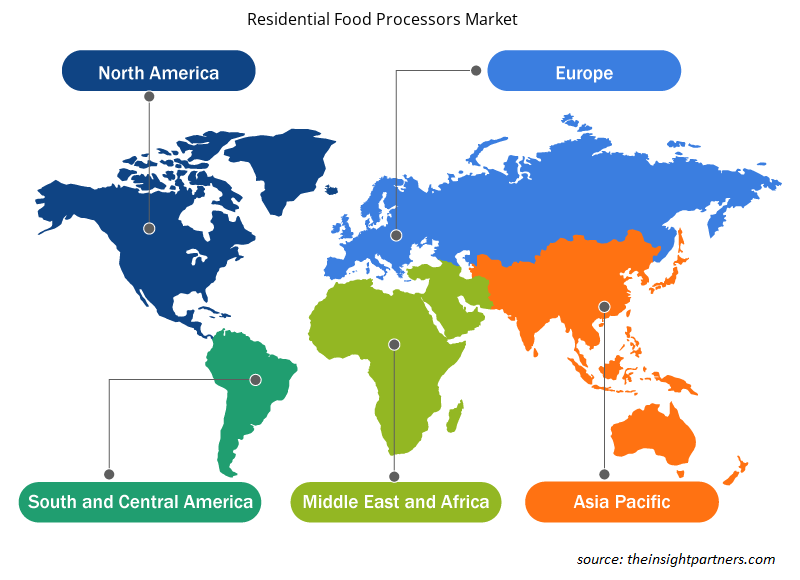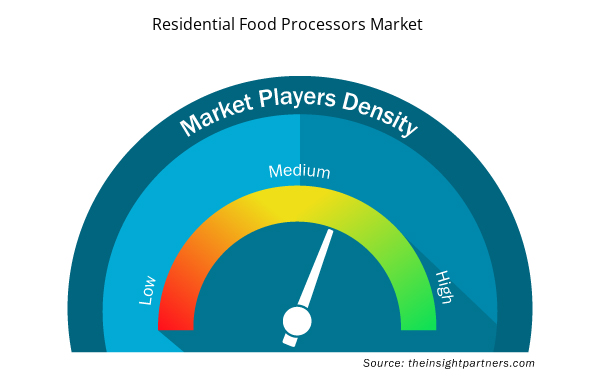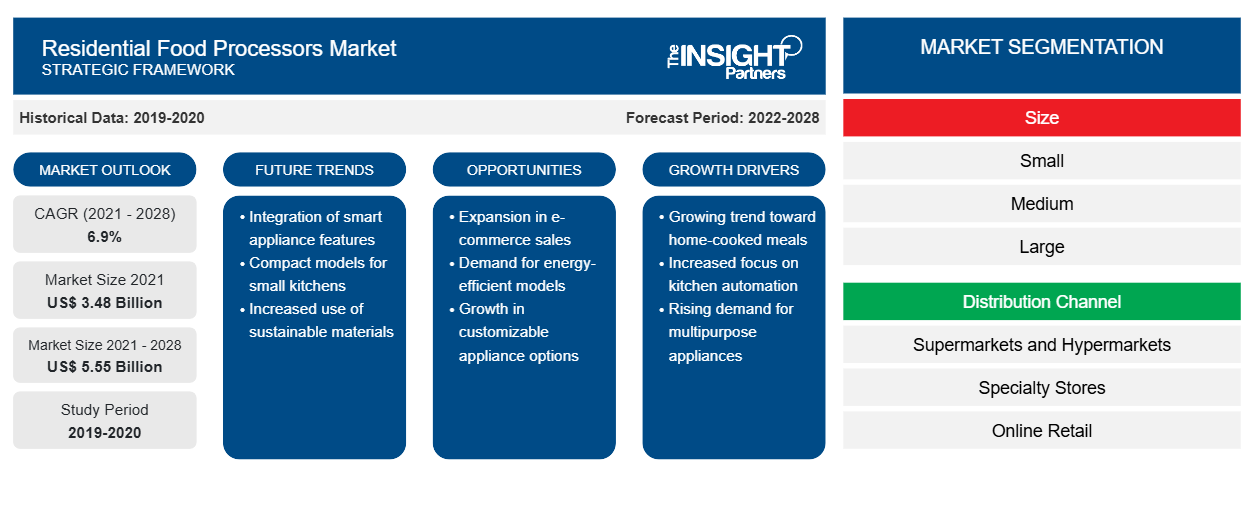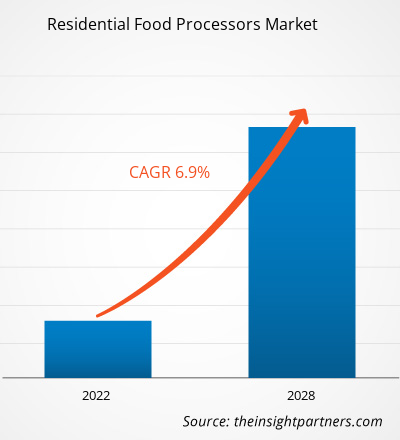El mercado de procesadores de alimentos residenciales se valoró en US$ 3.475,21 millones en 2021 y se proyecta que alcance los US$ 5.553,20 millones en 2028; se espera que crezca a una CAGR del 6,9% de 2021 a 2028.
Un procesador de alimentos doméstico es básicamente un electrodoméstico de cocina que se utiliza para facilitar las tareas repetitivas durante la preparación de alimentos. Los procesadores actuales son en su mayoría automatizados y facilitan la preparación de alimentos.
En 2020, Asia Pacífico dominó el mercado mundial de procesadores de alimentos residenciales y se espera que mantenga su dominio durante el período de pronóstico. El aumento de la población activa en toda la región ha provocado una mayor demanda de electrodomésticos de cocina y domésticos convenientes . Se espera que estos factores impulsen la demanda de procesadores de alimentos residenciales en toda la región. Además, el cambio en los estilos de vida de los consumidores ha llevado a una mayor adopción de electrodomésticos de cocina y domésticos modernizados. El aumento de la población en países como China e India ha provocado un aumento de la construcción de casas y complejos residenciales con espacio de cocina limitado. Por lo tanto, esto conduce a una mayor demanda de pequeños electrodomésticos de cocina, como mini procesadores de alimentos.
Personalice este informe según sus necesidades
Obtendrá personalización en cualquier informe, sin cargo, incluidas partes de este informe o análisis a nivel de país, paquete de datos de Excel, así como también grandes ofertas y descuentos para empresas emergentes y universidades.
- Obtenga las principales tendencias clave del mercado de este informe.Esta muestra GRATUITA incluirá análisis de datos, desde tendencias del mercado hasta estimaciones y pronósticos.
Perspectivas del mercado
Demanda creciente de productos convenientes
El estilo de vida de los consumidores se ha vuelto frenético en los últimos años debido al aumento de la presión laboral, lo que hace que se sientan agotados después de sus horas laborales habituales. Los profesionales que trabajan prefieren cada vez más electrodomésticos para el hogar y la cocina cómodos, automatizados e inteligentes que puedan ahorrarles tiempo y esfuerzo. Los procesadores de alimentos domésticos son multifuncionales y rápidos. Estos procesadores de alimentos funcionan de manera eficaz y significativa para facilitar el proceso de cocción incluso si un usuario cocina para un gran número de personas.
Información sobre el tamaño
Según el tamaño, el mercado de procesadores de alimentos residenciales se segmenta en pequeño, mediano y grande. En 2020, el segmento mediano dominó el mercado. La mayor restricción del tamaño y el espacio de la cocina en los países en desarrollo es uno de los factores que impulsa la demanda de procesadores de alimentos residenciales de tamaño mediano. El procesador de alimentos residencial mediano incluye un disco rebanador mediano, un disco triturador y una cuchilla picadora de acero inoxidable para procesar.
Entre los actores clave que operan en el mercado de procesadores de alimentos domésticos se encuentran Koninklijke Philips NV, Whirlpool Corporation, Breville Group Limited, De'Longhi Appliances Srl, Conair Corporation, Robert Bosch GmbH, MAGIMIX, SharkNinja Operating LLC, Groupe SEB y Spectrum Brands Inc. Los principales actores adoptan varias estrategias, como fusiones y adquisiciones y lanzamientos de productos, para expandir su presencia geográfica y su base de consumidores. Philips N.V., Whirlpool Corporation, Breville Group Limited, De’Longhi Appliances S.r.l., Conair Corporation, Robert Bosch GmbH, MAGIMIX, SharkNinja Operating LLC, Groupe SEB, and Spectrum Brands Inc. are among the key players operating in the residential food processors market. The leading players adopt several strategies, such as mergers & acquisitions and product launches, to expand their geographic presence and consumer base.
Perspectivas regionales del mercado de procesadores de alimentos residenciales
Los analistas de Insight Partners explicaron en detalle las tendencias y los factores regionales que influyen en el mercado de procesadores de alimentos residenciales durante el período de pronóstico. Esta sección también analiza los segmentos y la geografía del mercado de procesadores de alimentos residenciales en América del Norte, Europa, Asia Pacífico, Medio Oriente y África, y América del Sur y Central.

- Obtenga datos regionales específicos para el mercado de procesadores de alimentos residenciales
Alcance del informe de mercado de procesadores de alimentos residenciales
| Atributo del informe | Detalles |
|---|---|
| Tamaño del mercado en 2021 | US$ 3.48 mil millones |
| Tamaño del mercado en 2028 | 5.550 millones de dólares estadounidenses |
| CAGR global (2021-2028) | 6,9% |
| Datos históricos | 2019-2020 |
| Período de pronóstico | 2022-2028 |
| Segmentos cubiertos | Por tamaño
|
| Regiones y países cubiertos | América del norte
|
| Líderes del mercado y perfiles de empresas clave |
|
Densidad de actores del mercado de procesadores de alimentos residenciales: comprensión de su impacto en la dinámica empresarial
El mercado de procesadores de alimentos residenciales está creciendo rápidamente, impulsado por la creciente demanda de los usuarios finales debido a factores como la evolución de las preferencias de los consumidores, los avances tecnológicos y una mayor conciencia de los beneficios del producto. A medida que aumenta la demanda, las empresas amplían sus ofertas, innovan para satisfacer las necesidades de los consumidores y aprovechan las tendencias emergentes, lo que impulsa aún más el crecimiento del mercado.
La densidad de actores del mercado se refiere a la distribución de las empresas o firmas que operan dentro de un mercado o industria en particular. Indica cuántos competidores (actores del mercado) están presentes en un espacio de mercado determinado en relación con su tamaño o valor total de mercado.
Las principales empresas que operan en el mercado de procesadores de alimentos residenciales son:
- Philips NV, la línea Koninklijke
- Corporación Whirlpool
- Grupo Breville Limitado
- Delaware
Descargo de responsabilidad : Las empresas enumeradas anteriormente no están clasificadas en ningún orden particular.

- Obtenga una descripción general de los principales actores clave del mercado de procesadores de alimentos residenciales
Informe Destacado
- Tendencias progresivas en la industria de procesadores de alimentos residenciales para ayudar a los actores a desarrollar estrategias efectivas a largo plazo
- Estrategias de crecimiento empresarial adoptadas por las empresas para asegurar el crecimiento en los mercados desarrollados y en desarrollo
- Análisis cuantitativo del mercado global de procesadores de alimentos residenciales de 2019 a 2028
- Estimación de la demanda de procesadores de alimentos residenciales en diversas industrias
- Análisis PEST para ilustrar la eficacia de los compradores y proveedores que operan en la industria para predecir el crecimiento del mercado
- Desarrollos recientes para comprender el escenario competitivo del mercado y la demanda de los procesadores de alimentos residenciales
- Tendencias y perspectivas del mercado junto con los factores que impulsan y restringen el crecimiento del mercado de procesadores de alimentos residenciales
- Comprensión de las estrategias que sustentan el interés comercial con respecto al crecimiento del mercado global de procesadores de alimentos residenciales, lo que ayuda en el proceso de toma de decisiones.
- Tamaño del mercado de procesadores de alimentos residenciales en varios nodos del mercado
- Descripción detallada y segmentación del mercado global de procesadores de alimentos residenciales, así como su dinámica industrial
- Tamaño del mercado de procesadores de alimentos residenciales en varias regiones con oportunidades de crecimiento prometedoras
El "Análisis del mercado global de procesadores de alimentos residenciales hasta 2028" es un estudio especializado y profundo de la industria de bienes de consumo con un enfoque especial en el análisis de tendencias del mercado global de procesadores de alimentos residenciales. El informe tiene como objetivo proporcionar una descripción general del mercado con una segmentación detallada del mercado. El mercado de procesadores de alimentos residenciales está segmentado en función del tamaño, el canal de distribución y la geografía. Según el tamaño, el mercado se segmenta en pequeño, mediano y grande. Según el canal de distribución, el mercado de procesadores de alimentos residenciales está segmentado en supermercados e hipermercados, tiendas especializadas, venta minorista en línea y otros. Según la geografía, el mercado está segmentado en cinco regiones principales: América del Norte, Europa, Asia Pacífico, Medio Oriente y África, y América del Sur y Central.
Perfiles de empresas
- Philips NV, la línea Koninklijke
- Corporación Whirlpool
- Grupo Breville Limitado
- Electrodomésticos De'Longhi Srl
- Corporación Conair
- Robert Bosch GmbH
- Mezcla mágica
- Sociedad de responsabilidad limitada SharkNinja
- Grupo SEB
- Marcas del espectro inc.
- Análisis histórico (2 años), año base, pronóstico (7 años) con CAGR
- Análisis PEST y FODA
- Tamaño del mercado Valor/volumen: global, regional, nacional
- Industria y panorama competitivo
- Conjunto de datos de Excel



Report Coverage
Revenue forecast, Company Analysis, Industry landscape, Growth factors, and Trends

Segment Covered
This text is related
to segments covered.

Regional Scope
North America, Europe, Asia Pacific, Middle East & Africa, South & Central America

Country Scope
This text is related
to country scope.
Preguntas frecuentes
Asia Pacific is expected to be the fastest growing region within the global residential food processors market. The rising population in countries such as China and India have led to an increase in the construction of residential houses and complexes having limited kitchen space. Thus, there is an increased demand for multifunctional and small kitchen appliances. Thus, mini residential food processor is preferred in such countries in terms of convenience because they are lightweight, multifunctional and require little space. Thus, the rapidly changing lifestyle of consumers, increasing awareness related to eco-friendly products, and the rising trend of automation in day-to-day activities to save time are providing lucrative opportunities for the residential food processors market in Asia-Pacific.
In 2020, specialty stores held the largest market share in the global residential food processors market. Specialty stores focus on the specific product category and have wide product varieties. The stores provide a personalized shopping experience and a positive retail environment to the customers. They offer value-added products to their customers and focus on customer satisfaction. Moreover, specialty stores usually have trained staff who can assist the customers in making the purchase decisions. For the residential food processors market, specialty stores are expected to maintain their market prominence amongst other distribution channels due to the availability of specific products under one roof, pleasant atmosphere of store, and the presence of skilled staff that can help the customer choose the right product.
In 2020, the medium-size segment accounted for the largest market share. Medium-size residential food processors have a capacity of 9 to 12 cups and are great for making four portions of food at a time. It is suitable for chopping, dicing, mincing, and slicing. It is used for shredding hard cheeses, carrots, sprouts, and potatoes and pureeing soups, sauces, desserts, and dips. These food processors are also available with the multi-purpose dough blade and reversible slicing or shredding disc for preparing a variety of shapes and sizes ideal for recipes.
On the basis of distribution channels, online retail is the fastest-growing segment. Ecommerce platforms offer many products of various categories to customers across the world. Consumers can buy any product online from their homes or offices. Online retail is the fastest-growing distribution channel for the residential food processors market owing to many factors, such as ease of accessibility, availability of a wide range of products, cashback, discount coupons, and attractive deals. Aided by the disruption of physical stores due to the Covid-19 pandemic and lockdowns, the market for the online retail segment is expected to grow rapidly in the next few years.
The major players operating in the global residential food processors market are Koninklijke Philips N.V.; Whirlpool Corporation; Breville Group Limited; De’Longhi Appliances S.r.l.; Conair Corporation; Robert Bosch GmbH; MAGIMIX; SharkNinja Operating LLC; Groupe SEB; and Spectrum Brands Inc.
In 2020, Asia Pacific accounted for the largest share of the global residential food processors market. The countries in the region, such as China, India, and South Korea, are witnessing an upsurge in the middle-class population and growth in urbanization. The changing lifestyle of the consumers and increasing working population are propelling the adoption of modernized household and kitchen appliances.
Trends and growth analysis reports related to Consumer Goods : READ MORE..
The List of Companies - Residential Food Processors Market
- Koninklijke Philips N.V.
- Whirlpool Corporation
- Breville Group Limited
- De’Longhi Appliances S.r.l.
- Conair Corporation
- Robert Bosch GmbH
- MAGIMIX
- SharkNinja Operating LLC
- Groupe SEB
- Spectrum Brands, Inc
The Insight Partners performs research in 4 major stages: Data Collection & Secondary Research, Primary Research, Data Analysis and Data Triangulation & Final Review.
- Data Collection and Secondary Research:
As a market research and consulting firm operating from a decade, we have published and advised several client across the globe. First step for any study will start with an assessment of currently available data and insights from existing reports. Further, historical and current market information is collected from Investor Presentations, Annual Reports, SEC Filings, etc., and other information related to company’s performance and market positioning are gathered from Paid Databases (Factiva, Hoovers, and Reuters) and various other publications available in public domain.
Several associations trade associates, technical forums, institutes, societies and organization are accessed to gain technical as well as market related insights through their publications such as research papers, blogs and press releases related to the studies are referred to get cues about the market. Further, white papers, journals, magazines, and other news articles published in last 3 years are scrutinized and analyzed to understand the current market trends.
- Primary Research:
The primarily interview analysis comprise of data obtained from industry participants interview and answers to survey questions gathered by in-house primary team.
For primary research, interviews are conducted with industry experts/CEOs/Marketing Managers/VPs/Subject Matter Experts from both demand and supply side to get a 360-degree view of the market. The primary team conducts several interviews based on the complexity of the markets to understand the various market trends and dynamics which makes research more credible and precise.
A typical research interview fulfils the following functions:
- Provides first-hand information on the market size, market trends, growth trends, competitive landscape, and outlook
- Validates and strengthens in-house secondary research findings
- Develops the analysis team’s expertise and market understanding
Primary research involves email interactions and telephone interviews for each market, category, segment, and sub-segment across geographies. The participants who typically take part in such a process include, but are not limited to:
- Industry participants: VPs, business development managers, market intelligence managers and national sales managers
- Outside experts: Valuation experts, research analysts and key opinion leaders specializing in the electronics and semiconductor industry.
Below is the breakup of our primary respondents by company, designation, and region:

Once we receive the confirmation from primary research sources or primary respondents, we finalize the base year market estimation and forecast the data as per the macroeconomic and microeconomic factors assessed during data collection.
- Data Analysis:
Once data is validated through both secondary as well as primary respondents, we finalize the market estimations by hypothesis formulation and factor analysis at regional and country level.
- Macro-Economic Factor Analysis:
We analyse macroeconomic indicators such the gross domestic product (GDP), increase in the demand for goods and services across industries, technological advancement, regional economic growth, governmental policies, the influence of COVID-19, PEST analysis, and other aspects. This analysis aids in setting benchmarks for various nations/regions and approximating market splits. Additionally, the general trend of the aforementioned components aid in determining the market's development possibilities.
- Country Level Data:
Various factors that are especially aligned to the country are taken into account to determine the market size for a certain area and country, including the presence of vendors, such as headquarters and offices, the country's GDP, demand patterns, and industry growth. To comprehend the market dynamics for the nation, a number of growth variables, inhibitors, application areas, and current market trends are researched. The aforementioned elements aid in determining the country's overall market's growth potential.
- Company Profile:
The “Table of Contents” is formulated by listing and analyzing more than 25 - 30 companies operating in the market ecosystem across geographies. However, we profile only 10 companies as a standard practice in our syndicate reports. These 10 companies comprise leading, emerging, and regional players. Nonetheless, our analysis is not restricted to the 10 listed companies, we also analyze other companies present in the market to develop a holistic view and understand the prevailing trends. The “Company Profiles” section in the report covers key facts, business description, products & services, financial information, SWOT analysis, and key developments. The financial information presented is extracted from the annual reports and official documents of the publicly listed companies. Upon collecting the information for the sections of respective companies, we verify them via various primary sources and then compile the data in respective company profiles. The company level information helps us in deriving the base number as well as in forecasting the market size.
- Developing Base Number:
Aggregation of sales statistics (2020-2022) and macro-economic factor, and other secondary and primary research insights are utilized to arrive at base number and related market shares for 2022. The data gaps are identified in this step and relevant market data is analyzed, collected from paid primary interviews or databases. On finalizing the base year market size, forecasts are developed on the basis of macro-economic, industry and market growth factors and company level analysis.
- Data Triangulation and Final Review:
The market findings and base year market size calculations are validated from supply as well as demand side. Demand side validations are based on macro-economic factor analysis and benchmarks for respective regions and countries. In case of supply side validations, revenues of major companies are estimated (in case not available) based on industry benchmark, approximate number of employees, product portfolio, and primary interviews revenues are gathered. Further revenue from target product/service segment is assessed to avoid overshooting of market statistics. In case of heavy deviations between supply and demand side values, all thes steps are repeated to achieve synchronization.
We follow an iterative model, wherein we share our research findings with Subject Matter Experts (SME’s) and Key Opinion Leaders (KOLs) until consensus view of the market is not formulated – this model negates any drastic deviation in the opinions of experts. Only validated and universally acceptable research findings are quoted in our reports.
We have important check points that we use to validate our research findings – which we call – data triangulation, where we validate the information, we generate from secondary sources with primary interviews and then we re-validate with our internal data bases and Subject matter experts. This comprehensive model enables us to deliver high quality, reliable data in shortest possible time.


 Obtenga una muestra gratuita de este informe
Obtenga una muestra gratuita de este informe